-
 Bitcoin
Bitcoin $83,255.2836
-2.28% -
 Ethereum
Ethereum $1,821.6270
-4.98% -
 Tether USDt
Tether USDt $0.9997
-0.02% -
 XRP
XRP $2.0300
-5.62% -
 BNB
BNB $592.2419
-3.00% -
 Solana
Solana $121.1432
-4.53% -
 USDC
USDC $0.9998
-0.01% -
 Dogecoin
Dogecoin $0.1649
-5.26% -
 Cardano
Cardano $0.6493
-4.64% -
 TRON
TRON $0.2344
-0.97% -
 Toncoin
Toncoin $3.9186
-3.26% -
 UNUS SED LEO
UNUS SED LEO $9.3843
1.32% -
 Chainlink
Chainlink $13.0875
-7.63% -
 Stellar
Stellar $0.2581
-5.40% -
 Avalanche
Avalanche $18.3472
-6.91% -
 Sui
Sui $2.2957
-5.79% -
 Shiba Inu
Shiba Inu $0.0...01215
-4.50% -
 Hedera
Hedera $0.1623
-5.09% -
 Litecoin
Litecoin $82.9416
-2.41% -
 Polkadot
Polkadot $4.0027
-4.37% -
 MANTRA
MANTRA $6.1965
-1.88% -
 Bitcoin Cash
Bitcoin Cash $296.1636
-4.49% -
 Bitget Token
Bitget Token $4.5300
-2.20% -
 Dai
Dai $0.9998
-0.04% -
 Ethena USDe
Ethena USDe $0.9998
-0.02% -
 Pi
Pi $0.6552
-7.64% -
 Hyperliquid
Hyperliquid $12.3484
-7.49% -
 Monero
Monero $216.8009
-0.80% -
 Uniswap
Uniswap $5.9283
-6.22% -
 Aptos
Aptos $5.1281
-5.57%
Is there a time limit for Bitcoin contract trading?
Bitcoin contract trading involves futures (with expiry dates) and perpetual contracts (without). While perpetuals lack expiry, funding rates and liquidation risks, influenced by market volatility, impose practical time constraints on both contract types.
Mar 01, 2025 at 09:48 am
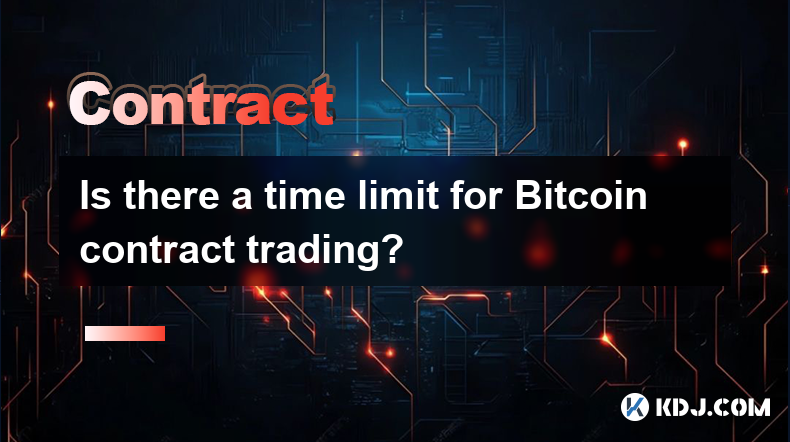
Is There a Time Limit for Bitcoin Contract Trading? A Deep Dive into Bitcoin Futures and Perpetual Contracts
Key Points:
- Understanding Contract Types: Bitcoin contract trading encompasses both futures contracts with defined expiry dates and perpetual contracts without expiry. The presence or absence of an expiry date fundamentally dictates the time constraints involved.
- Futures Contracts: Defined Expiry: Bitcoin futures contracts are agreements to buy or sell Bitcoin at a predetermined price on a specific future date. This inherent expiry date imposes a clear time limit on the contract's lifespan. Trading strategies must account for this impending expiry.
- Perpetual Contracts: No Expiry: Perpetual contracts, also known as inverse perpetual swaps, aim to mimic the characteristics of holding Bitcoin indefinitely. While theoretically without expiry, practical considerations such as funding rates and potential liquidation influence trading durations.
- Funding Rates and their Impact: Perpetual contracts utilize funding rates to maintain price parity with the spot market. These rates, which fluctuate based on supply and demand, can significantly impact the profitability of holding a long or short position over extended periods. Understanding funding rate dynamics is crucial for managing risk and optimizing trading strategies.
- Liquidation Risk: Both futures and perpetual contracts carry the risk of liquidation, where the exchange closes a position due to insufficient margin. This risk becomes more pronounced with longer holding periods, particularly in volatile market conditions. Risk management techniques are paramount to mitigate this risk.
Understanding Bitcoin Contract Trading Time Limits
- Futures Contracts: The Clock is Ticking
Bitcoin futures contracts are standardized agreements to buy or sell a specified quantity of Bitcoin at a predetermined price on a future date, known as the expiry date. This date marks the end of the contract's life. Once the expiry date arrives, the contract settles, meaning the buyer either receives Bitcoin at the agreed-upon price or the seller delivers Bitcoin. Alternatively, the contract might settle in cash, with the profit or loss calculated based on the difference between the contract's price at the time of opening and the Bitcoin spot price at expiry. The time limit inherent in futures contracts is thus fixed and explicitly defined by the exchange offering the contract. Traders must carefully plan their strategies around this expiry date, considering factors like market volatility and potential price movements leading up to settlement. Failure to manage positions before expiry can lead to unwanted liquidation or losses. Different exchanges offer futures contracts with various expiry dates, ranging from weekly, bi-weekly, monthly, quarterly, and even yearly contracts. This allows traders to choose a timeframe that best aligns with their investment horizon and risk tolerance. For example, a trader anticipating a short-term price surge might prefer a weekly contract, while a trader with a longer-term bullish outlook might opt for a quarterly or yearly contract. The choice of expiry date is a crucial aspect of risk management in Bitcoin futures trading. Furthermore, the trading volume and liquidity usually vary across different expiry dates. Traders should pay attention to these factors when choosing a contract, as contracts with lower liquidity might be more difficult to enter or exit.
- Perpetual Contracts: A Seemingly Limitless Horizon
Unlike futures contracts, perpetual contracts (also known as inverse perpetual swaps) do not have a predefined expiry date. This characteristic makes them attractive to traders who want exposure to Bitcoin without the constraints of an approaching expiry. However, this "limitless" horizon doesn't imply an absence of time considerations. Instead, perpetual contracts use a mechanism called a funding rate to maintain price parity with the spot market. The funding rate is a periodic payment made between long and short positions, ensuring that the perpetual contract's price remains closely aligned with the spot price of Bitcoin. If the price of the perpetual contract deviates significantly from the spot price, the funding rate adjusts to incentivize traders to bring the price back into alignment. For instance, if the perpetual contract price is significantly higher than the spot price, long positions will pay a funding rate to short positions. Conversely, if the perpetual contract price is lower than the spot price, short positions will pay a funding rate to long positions. This dynamic funding rate mechanism is a critical aspect of perpetual contracts and significantly influences their trading dynamics. While perpetual contracts don't have an expiry date, the accumulation of funding rates over time can significantly impact profitability. Holding a long or short position for an extended period with consistently unfavorable funding rates can lead to substantial losses, effectively imposing a time constraint based on cost. Therefore, understanding funding rate dynamics is crucial for long-term perpetual contract trading.
- Liquidation: A Time-Sensitive Risk in Both Contract Types
Both futures and perpetual contracts involve the risk of liquidation. Liquidation occurs when the exchange closes a trader's position because the margin in their account is insufficient to cover potential losses. The margin requirement is a percentage of the contract's value that the trader must maintain to keep their position open. If the market moves against the trader's position and the margin falls below the maintenance margin, the exchange automatically liquidates the position to prevent further losses. The time element comes into play because the longer a position is held, the greater the potential for significant price movements that could trigger liquidation. Highly volatile market conditions increase the risk of liquidation, regardless of the contract type. For instance, a sudden and sharp price drop can quickly deplete a trader's margin, leading to liquidation even if the initial margin was substantial. This is particularly true for leveraged positions, where the use of borrowed funds amplifies both profits and losses. Therefore, effective risk management is crucial to mitigate the risk of liquidation. Traders should use appropriate leverage levels, monitor their positions closely, and adjust their margin as needed to prevent liquidation.
- Impact of Market Volatility on Time Constraints
Market volatility significantly influences the effective time limit of Bitcoin contract trading. During periods of high volatility, rapid price swings can quickly lead to liquidation, regardless of the trader's initial intentions. This necessitates more frequent monitoring and potentially shorter holding periods. Conversely, during periods of low volatility, traders might be able to hold positions for longer durations without significant risk of liquidation. This highlights the dynamic nature of time constraints in Bitcoin contract trading, emphasizing the importance of adapting strategies based on current market conditions. Understanding market sentiment and using technical indicators to gauge volatility are crucial for managing risk and optimizing trading strategies. For example, during periods of extreme volatility, traders might choose to reduce their leverage, shorten their holding periods, or even exit their positions altogether to avoid liquidation.
FAQs
Q: What is the difference between Bitcoin futures and perpetual contracts?
A: Bitcoin futures contracts have a defined expiry date, while perpetual contracts do not. Futures contracts settle on the expiry date, while perpetual contracts use funding rates to maintain price parity with the spot market.
Q: How do funding rates affect perpetual contract trading?
A: Funding rates are periodic payments between long and short positions in perpetual contracts, designed to keep the contract's price aligned with the spot price of Bitcoin. These rates can significantly impact profitability over time, especially for long-term positions.
Q: What is liquidation, and how does it relate to time limits in contract trading?
A: Liquidation is the forced closure of a trading position by the exchange due to insufficient margin. The longer a position is held, the greater the risk of liquidation, particularly during volatile market conditions.
Q: Can I hold a Bitcoin futures contract indefinitely?
A: No. Bitcoin futures contracts have a specific expiry date. You must close your position before the expiry date, or it will be automatically settled.
Q: How does market volatility affect the time constraints of Bitcoin contract trading?
A: High volatility increases the risk of liquidation and may necessitate shorter holding periods. Low volatility allows for potentially longer holding periods. Traders need to adapt their strategies based on current market conditions.
Q: Are there any other factors that might influence the effective time limit of a Bitcoin contract?
A: Yes. Factors such as exchange-specific rules, margin requirements, and individual risk tolerance all play a role in determining the practical time limit a trader might choose for their positions. Also, the liquidity of the contract at different times can also influence trading duration. Low liquidity may make it difficult to exit a position quickly if needed.
Disclaimer:info@kdj.com
The information provided is not trading advice. kdj.com does not assume any responsibility for any investments made based on the information provided in this article. Cryptocurrencies are highly volatile and it is highly recommended that you invest with caution after thorough research!
If you believe that the content used on this website infringes your copyright, please contact us immediately (info@kdj.com) and we will delete it promptly.
- Bitcoin (BTC) Price Prediction: Will BTC Break Out Above $86,000 to Signal the Start of a Recovery?
- 2025-04-03 07:05:12
- Recent market activity shows a split in altcoin performance.
- 2025-04-03 07:05:12
- Publicly Traded Businesses Continuously Buying Bitcoin ($BTC) to Demonstrate Its Emerging Significance
- 2025-04-03 07:00:14
- Credefi Launches Its NFT Bonds Product on the Polytrade Marketplace
- 2025-04-03 07:00:14
- What If the Next Big Crypto Boom Isn't in Bitcoin or Ethereum—but in Meme Coins?
- 2025-04-03 06:55:13
- Despite Price Drop, Shibarium Network Processes Over 1 Billion Transactions
- 2025-04-03 06:55:13
Related knowledge
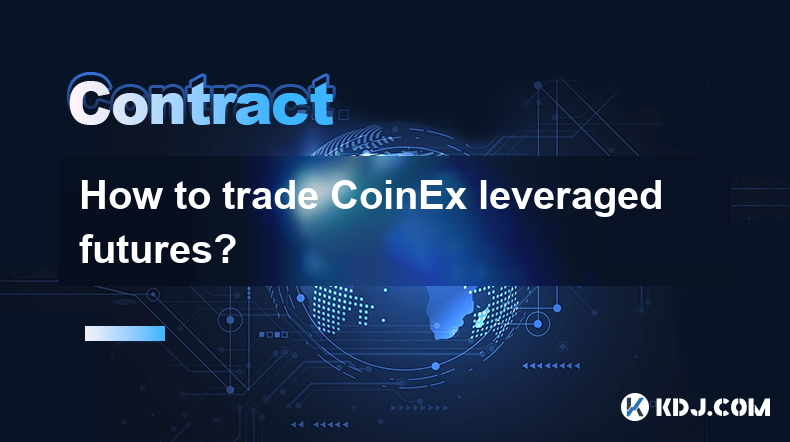
How to trade CoinEx leveraged futures?
Apr 03,2025 at 03:56am
Trading leveraged futures on CoinEx can be an exciting way to potentially amplify your profits in the cryptocurrency market. Leveraged futures allow traders to borrow funds to increase their trading position, which can lead to higher returns, but also comes with increased risk. In this article, we will guide you through the process of trading CoinEx lev...
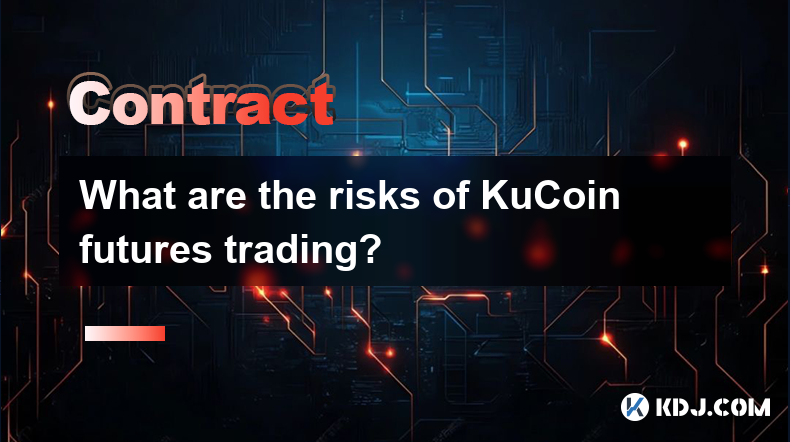
What are the risks of KuCoin futures trading?
Apr 03,2025 at 01:14am
KuCoin futures trading offers traders the opportunity to speculate on the future price of cryptocurrencies, but it comes with its own set of risks that traders need to be aware of. Understanding these risks is crucial for anyone looking to engage in futures trading on the KuCoin platform. This article will delve into the various risks associated with Ku...
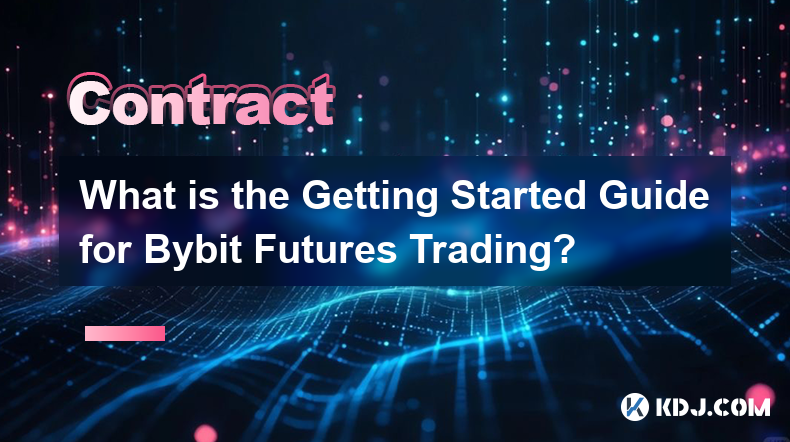
What is the Getting Started Guide for Bybit Futures Trading?
Apr 03,2025 at 12:42am
Bybit is a popular cryptocurrency exchange that offers futures trading, allowing users to speculate on the price movements of various cryptocurrencies. If you're new to Bybit futures trading, this guide will walk you through the essential steps to get started. From setting up your account to understanding the basics of futures trading, we'll cover every...
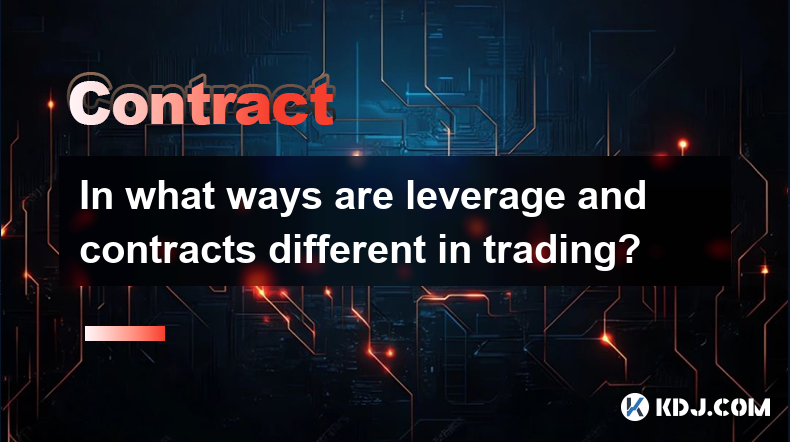
In what ways are leverage and contracts different in trading?
Apr 03,2025 at 03:42am
Leverage and contracts are two fundamental concepts in cryptocurrency trading that, while related, serve different purposes and have distinct characteristics. Understanding the differences between them is crucial for any trader looking to navigate the volatile crypto markets effectively. This article will delve into the specifics of leverage and contrac...
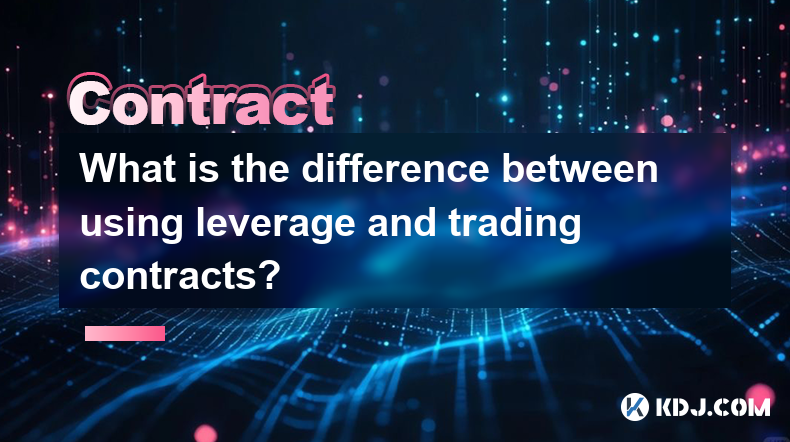
What is the difference between using leverage and trading contracts?
Apr 03,2025 at 05:21am
Leverage and trading contracts are two common terms in the cryptocurrency trading world, each with distinct features and implications. Leverage allows traders to increase their exposure to a cryptocurrency by borrowing funds from a broker. This can amplify both potential profits and losses. On the other hand, trading contracts, such as futures and optio...

how to find bitcoin contract address
Mar 22,2025 at 05:07pm
How to Find a Bitcoin Contract Address: A Deep DiveFinding a Bitcoin contract address requires understanding that Bitcoin itself doesn't inherently support smart contracts like Ethereum. The concept of a "contract address" is fundamentally tied to blockchain platforms with smart contract functionality. Therefore, searching for a Bitcoin contract address...

How to trade CoinEx leveraged futures?
Apr 03,2025 at 03:56am
Trading leveraged futures on CoinEx can be an exciting way to potentially amplify your profits in the cryptocurrency market. Leveraged futures allow traders to borrow funds to increase their trading position, which can lead to higher returns, but also comes with increased risk. In this article, we will guide you through the process of trading CoinEx lev...

What are the risks of KuCoin futures trading?
Apr 03,2025 at 01:14am
KuCoin futures trading offers traders the opportunity to speculate on the future price of cryptocurrencies, but it comes with its own set of risks that traders need to be aware of. Understanding these risks is crucial for anyone looking to engage in futures trading on the KuCoin platform. This article will delve into the various risks associated with Ku...

What is the Getting Started Guide for Bybit Futures Trading?
Apr 03,2025 at 12:42am
Bybit is a popular cryptocurrency exchange that offers futures trading, allowing users to speculate on the price movements of various cryptocurrencies. If you're new to Bybit futures trading, this guide will walk you through the essential steps to get started. From setting up your account to understanding the basics of futures trading, we'll cover every...

In what ways are leverage and contracts different in trading?
Apr 03,2025 at 03:42am
Leverage and contracts are two fundamental concepts in cryptocurrency trading that, while related, serve different purposes and have distinct characteristics. Understanding the differences between them is crucial for any trader looking to navigate the volatile crypto markets effectively. This article will delve into the specifics of leverage and contrac...

What is the difference between using leverage and trading contracts?
Apr 03,2025 at 05:21am
Leverage and trading contracts are two common terms in the cryptocurrency trading world, each with distinct features and implications. Leverage allows traders to increase their exposure to a cryptocurrency by borrowing funds from a broker. This can amplify both potential profits and losses. On the other hand, trading contracts, such as futures and optio...

how to find bitcoin contract address
Mar 22,2025 at 05:07pm
How to Find a Bitcoin Contract Address: A Deep DiveFinding a Bitcoin contract address requires understanding that Bitcoin itself doesn't inherently support smart contracts like Ethereum. The concept of a "contract address" is fundamentally tied to blockchain platforms with smart contract functionality. Therefore, searching for a Bitcoin contract address...
See all articles
























































































